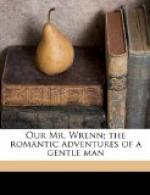Dawn came. From a hilltop they made out the roofs of a town and stopped to wonder at its silence, as though through long ages past no happy footstep had echoed there. The fog lifted. The morning was new-born and clean, and they fairly sang as they clattered up to an old coaching inn and demanded breakfast of an amazed rustic pottering about the inn yard in a smock. He did not know that to a “thrilling” Mr. Wrenn he—or perhaps it was his smock—was the hero in an English melodrama. Nor, doubtless, did the English crisp bacon and eggs which a sleepy housemaid prepared know that they were theater properties. Why, they were English eggs, served at dawn in an English inn—a stone-floored raftered room with a starling hanging in a little cage of withes outside the latticed window. And there were no trippers to bother them! (Mr. Wrenn really used the word “trippers” in his cogitations; he had it from Istra.)
When he informed her of this occult fact she laughed, “You know mighty well, Mouse, that you have a sneaking wish there were one Yankee stranger here to see our glory.”
“I guess that’s right.”
“But maybe I’m just as bad.”
For once their tones had not been those of teacher and pupil, but of comrades. They set out from the inn through the brightening morning like lively boys on a vacation tramp.
The sun crept out, with the warmth and the dust, and Istra’s steps lagged. As they passed the outlying corner of a farm where a straw-stack was secluded in a clump of willows Istra smiled and sighed: “I’m pretty tired, dear. I’m going to sleep in that straw-stack. I’ve always wanted to sleep in a straw-stack. It’s comme il faut for vagabonds in the best set, you know. And one can burrow. Exciting, eh?”
She made a pillow of her khaki jacket, while he dug down to a dry place for her. He found another den on the other side of the stack.
It was afternoon when he awoke. He sprang up and rushed around the stack. Istra was still asleep, curled in a pathetically small childish heap, her tired face in repose against the brown-yellow of her khaki jacket. Her red hair had come down and shone about her shoulders.
She looked so frail that he was frightened. Surely, too, she’d be very angry with him for letting her come on this jaunt.
He scribbled on a leaf from his address-book—religiously carried for six years, but containing only four addresses—this note:
Gone to get stuff for bxfst be right back.—W. W.
and, softly crawling up the straw, left the note by her head. He hastened to a farm-house. The farm-wife was inclined to be curious. O curious farm-wife, you of the cream-thick Essex speech and the shuffling feet, you were brave indeed to face Bill Wrenn the Great, with his curt self-possession, for he was on a mission for Istra, and he cared not for the goggling eyes of all England. What though he was a bunny-faced man with an innocuous mustache? Istra would be awakening hungry. That was why he bullied you into selling him a stew-pan and a bundle of faggots along with the tea and eggs and a bread loaf and a jar of the marmalade your husband’s farm had been making these two hundred years. And you should have had coffee for him, not tea, woman of Essex.




